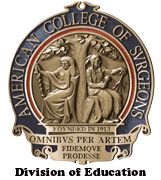Endovascular Management of a Traumatic Carotid-Jugular Fistuala
Chirag D. Gandhi, MD; Sharif Ellozy, MD; Edward Chin, MD; David Johnson, MD; Aman Patel, MD

| Product Details | |
| Product ID: | ACS-2655 |
| Year Produced: | 2007 |
| Length: | 11 min. |
Pentrating carotid trauma is a highly morbid condition with mortality and stroke rates approaching 40%. When feasible, surgical repair is advocated over ligation but open repair is associated with a risk of cranial nerve injury and major hemorrhage. As an alternative, this report describes the endovascular management of a traumatic carotid artery-internal jugular vein high-flow fistula secondary to a gunshot wound. A 67 year-old male presented to the ER after sustaining a Zone 2 gunshot wound to the left neck. Angiography confirmed the presence of a carotid-jugular fistula with excellent collateral filling of the cerebral circulation. The treatment options included surgical exploration and repair, endovascular placement of a covered stent graft across the region of injury, and endovascular carotid sacrifice. The left carotid artery was embolized with coils and nBCA glue. The left carotid artery was successfully embolized. After treatment no further filling of the fistula either antegrade or retrograde was seen. The patient had no evidence of aerodigestive injury and was quickly extubated. He remained neurologically intact and was discharged home. If cerebral angiography demonstrates adequate intracranial collateral flow, endovascular embolization is a viable and safe alternative for the treatment of traumatic carotid artery-internal jugular vein fistulas.



